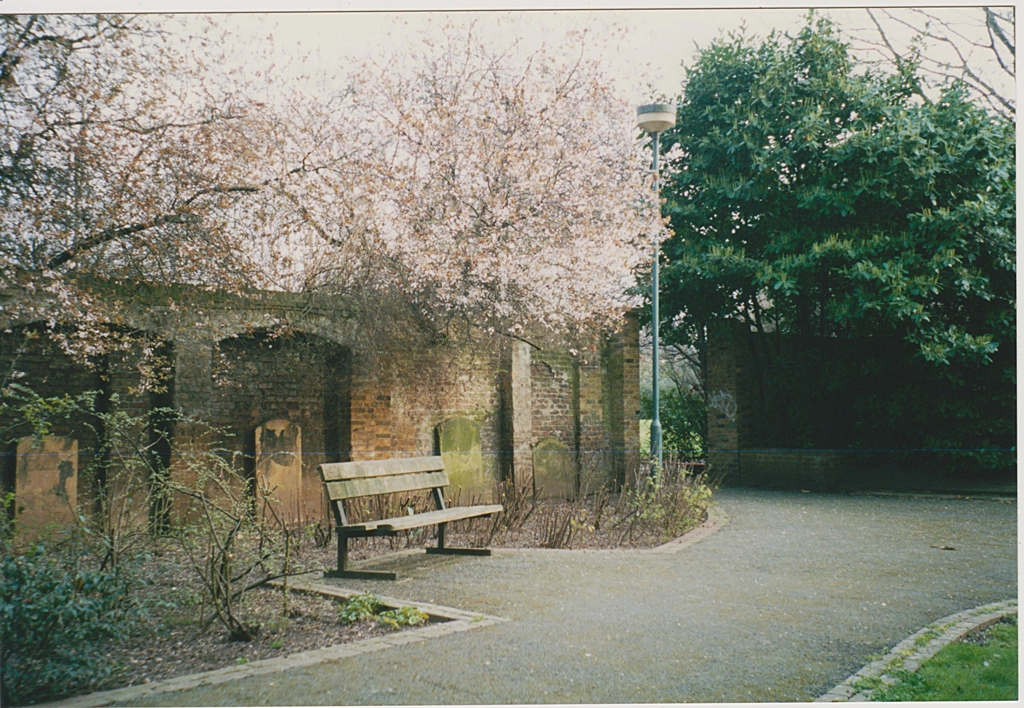Old Paradise Gardens (Lambeth)
Brief Description
The park, formerly known as Lambeth High Street Recreation Ground, was previously a burial ground provided to the parish by the Archbishop of Canterbury in 1703. It was extended in 1816, but by 1853 was full and closed to burial. In 1880 it was decided to convert it into a public garden, which opened in 1884. Gravestones were moved to boundary walls, the mortuary was left standing, as was a watch house although this has now gone. The recreation ground was extended in 1929 and by the 1970s was largely asphalted. Since re-landscaped, it has grassy mounds, a water feature, with shrubs and spring bulbs planted. In 2013 refurbishment was completed and the park was renamed Old Paradise Gardens. In 2023 a new community garden was introduced in the south east corner designed by Dan Pearson Studios under the leadership of The Garden Museum nearby.
Practical Information
- Previous / Other name:
- Lambeth High Street Recreation Ground; Old Burial Ground, High Street, Lambeth;
- Site location:
- Lambeth High Street; Old Paradise Street
- Postcode:
- SE11 6AL
- What 3 Words:
- fleet.abode.picked
- Type of site:
- Public Gardens
- Borough:
- Lambeth
- Open to public?
- Yes
- Opening times:
- 7.30am - 15 minutes before sunset
- Special conditions:
- Facilities:
- Children's play area (dog free); dog exercise area
- Events:
- Public transport:
- Tube: Lambeth North (Bakerloo)
- Research updated:
- 08/07/2020
- Last minor changes:
- 19/07/2023
Please check with the site owner or manager for latest news. www.lambeth.gov.uk
Full Site Description
The land behind Lambeth High Street was provided for a parish burial ground by Thomas Tenison, Archbishop of Canterbury. The site had previously been leased to a gardener, from whom it was purchased in 1703 for £120. Archbishop Tenison also gave a black velvet pall to be used for funerals of 'Persons of some Condition' who were able to leave 10 shillings for the poor'. He also instructed that his own body should be draped with the same pall not in a coach, having 'an Aversion to Funeral Pomps, and would be no means at my own Interment give Countenance to them'. In 1706 Archbishop Tenison provided a girls' school adjoining the passage from Lambeth High Street to the burial ground. In order to provide an income for the school he also purchased part of the site of Norfolk House where Catherine Howard had lived as a girl, which was to the north of the burial ground. This area had a number of ancient houses on it and a passage called Tearoe's Alley, which was cleared in 1814 when it was purchased by the Trustees to extend the burial ground, consecrated in 1816. The burial ground was closed in 1853.
By 1880 the former burial ground was 'very unsightly' and the Lambeth Vestry decided to turn it into a public garden, and this was completed in 1884. Gravestones were moved to boundary walls, the mortuary was left standing, as was a watch house that had been erected in 1825 on Lambeth High Street for holding 'the drunk and disorderly'. The latter has now gone but its site is marked with a stone. The new garden was conveyed to Lambeth Vestry and then to Lambeth Borough Council. Gravestones and chest tombs dating from the C18th and C19th remain attached to the former boundary wall. In 1929 the recreation ground was enlarged when the site of a glass bottle factory in Whitgift Street was purchased for £700. By the late 1970s the recreation ground had been largely asphalted over, but it has since been re-landscaped with grassy mounds, a water feature, shrubs and spring bulbs planted, and seating, pergolas and other features provided. In 2004 it was a recipient of Section 106 monies as part of Vauxhall Cross Development. In 2013 the park was again refurbished, with new entrance gates erected on Old Paradise Street. When it was re-opened by local MP and supporter Kate Hoey, the park was renamed Old Paradise Gardens.
In April 2023 a new community garden, designed by Dan Pearson Studios, featuring a patchwork of native, medicinal and wildlife-friendly planting was introduced to the south eastern corner of the site. This new area provides opportunities for food-growing and other community garden sessions led by the nearby Garden Museum and is demarcated by a hand-woven hazel fence.
Sources consulted:
Marie Draper 'Lambeth's Open Spaces, An historical account', LB Lambeth 1979; Old Paradise Gardens park history on Lambeth Village website: http://www.lambethvillage.co.uk/park-history/
Further Information (Planning and Conservation)
- Grid ref:
- TQ306788 (530650,178850)
- Size in hectares:
- 0.76
- Site ownership:
- LB Lambeth
- Site management:
- Environment Directorate, Parks and Greenspaces Unit (Team Lambeth)
- Date(s):
- 1703; 1884; 1929; late C20th
- Designer(s):
- Listed structures:
- LBII: enclosing walls of the former burial ground
- On National Heritage List for England (NHLE), Parks & Gardens:
No- Registered common or village green on Commons Registration Act 1965:
No- Protected under London Squares Preservation Act 1931:
No
Local Authority Data
The information below is taken from the relevant Local Authority's planning legislation, which was correct at the time of research but may have been amended in the interim. Please check with the Local Authority for latest planning information.
- On Local List:
- No
- In Conservation Area:
- Yes
- Conservation Area name:
- Lambeth Palace
- Tree Preservation Order:
- No
- Nature Conservation Area:
- No
- Green Belt:
- No
- Metropolitan Open Land:
- No
- Special Policy Area:
- No
- Other LA designation:
- Park
Photos
Lambeth High Street Recreation Ground (now Old Paradise Gardens), gravestones set against boundary wall, March 2002. Photograph Sally Williams
Click a photo to enlarge.
Please note the Inventory and its content are provided for your general information only and are subject to change. It is your responsibility to check the accuracy.







